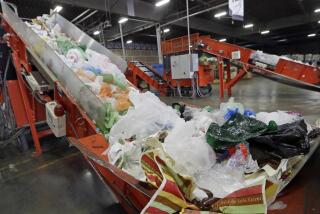A Can-Do View Cuts Into Trash
- Share via
For the final Earth Day of the decade, environmental groups are making a big push to remind consumers that one person can make a difference, and often just the smallest behavior modification can bring big results.
For instance, if it seems a waste of time to shuffle cans and bottles to the recycling bin, consider this bulletin from the California Department of Conservation. Since the state introduced its beverage-container recycling program 13 years ago, Californians have recycled more than 100 billion cans and bottles. To put this into perspective, the department offered some fun factoids:
* During those 13 years, Californians have recycled more than 20,000 beverage containers every minute of every day, around the clock.
* Contents of the beverage containers would fill roughly 21,175 Olympic-size swimming pools.
* Length of the beverage containers would extend more than 357 times around the equator.
* If aluminum cans were used to make 747 airplanes, the number of tons recycled would be enough to manufacture 48 jumbo jets.
* The amount of electricity saved by recycling is enough to power every television in California for nearly 15 years.
* In recycling 100 billion beverage containers, Californians have redeemed $250 million in deposit fees--enough to purchase a year’s worth of groceries for 25,000 people.
Even easier than recycling is adjusting your shopping patterns to focus on simpler packaging, says the current environmental newsletter, Use Less Stuff Report, which highlights a new packaging study commissioned by the National Consumers League in Washington, D.C.
The study examined 40 grocery products and measured the different types of packaging used to market them. For instance, buying beer in aluminum cans versus glass bottles will reduce the weight of packaging refuse by more than 165 pounds a year, and that’s consuming one six-pack a week. Juice in plastic jugs saves almost 67 pounds over glass bottles. And such efforts can be economical--the average family could save $150 a year by simply buying cereal in bags rather than boxes and buying the economy size.
In short, if you shop smart, you can “save cash and slash trash,” promises the ULS Report, which can be reached online at https://www.cygnus-group.com, or by mail at ULS Report, P.O. Box 130116, Ann Arbor, MI 48113.


